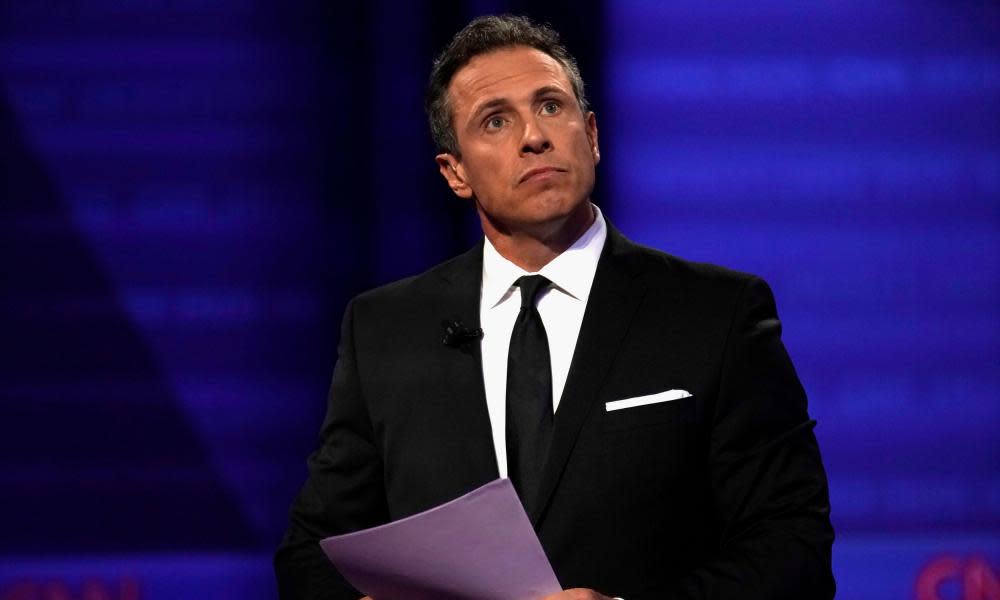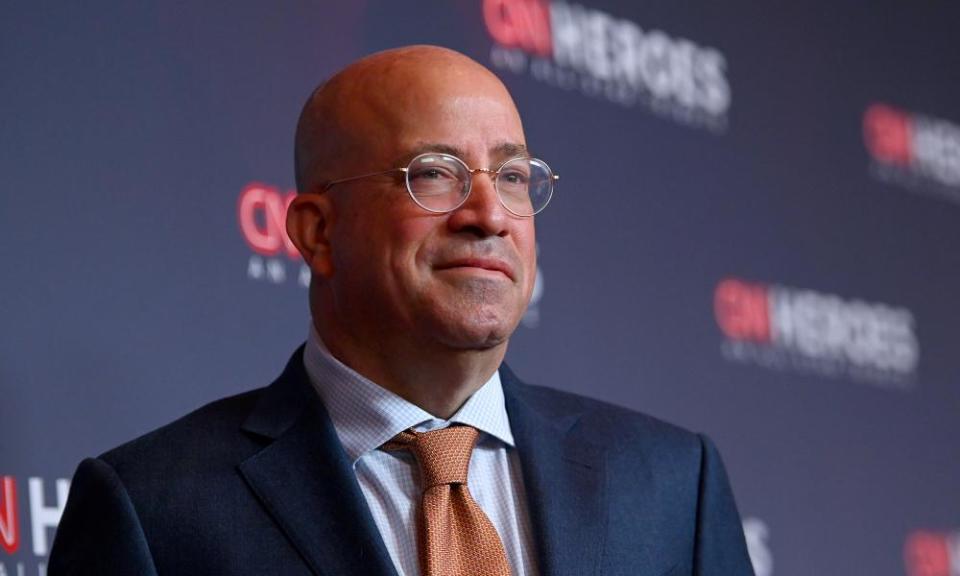CNN mess over Cuomo shows dangers of news-as-entertainment

- Oops!Something went wrong.Please try again later.
- Oops!Something went wrong.Please try again later.
- Oops!Something went wrong.Please try again later.
- Oops!Something went wrong.Please try again later.
CNN found itself at the center of the US news cycle this week, after its primetime host Chris Cuomo was abruptly fired for helping to shape the response of his brother, the former New York governor Andrew Cuomo to multiple accusations of sexual harassment.
The younger sibling, 51, lost three jobs in as many days – as CNN host, Sirius satellite radio jock, and a contract for a book provisionally titled Deep Denial – and now faces an investigation by outside lawyers for CNN, while the elder Cuomo, 64, faces a justice department investigation stemming from a damning report issued by New York’s attorney general.
Related: Chris Cuomo accused of sexual harassment days before CNN fired him
But the scandal has also placed CNN in the crosshairs after Cuomo accused his boss, network president Jeff Zucker, of knowing about his involvement in trying to manage his brother’s scandal. “There were no secrets about this, as other individuals besides Mr Cuomo can attest,” a Cuomo spokesman told the Wall Street Journal last weekend.
The network hit back, calling the accusations “patently false” and illustrated why he had been fired “for violating our standards and practices, as well as his lack of candor”.
CNN then announced it would resist paying out $18m remaining on Cuomo’s four-year contract, a deal that amounted to $25,000 a night for an hour-long primetime segment. Cuomo is understood to have hired LA attorney Bryan Freedman, and CNN is working with litigator Daniel Petrocelli.
It was a remarkable end to what had always appeared a chummy relationship between the star and his employer, who had seemed firm in backing him. But CNN’s problems do not end there. Fellow star Don Lemon, whose primetime hour came after Cuomo’s, has been accused of sexual harassment in a bar three years ago. Lemon’s accuser, ex-bartender Dustin Hice, made the claims on the Megyn Kelly Show this week.
Lemon also came up in the staged attack of Empire star Jussie Smollett, when the actor testified at trial that he received a text from Lemon warning him that his decision not to hand his phone records over to detectives had triggered an investigation.
Until the moment of Cuomo’s termination from the cable news station, he and CNN had expressed a “family first, job second” rationale.
“This was a very unique situation, and so we did allow for some leeway for Chris that, you know, was unique to that situation for somebody in that role with a brother in that role during a once-in-a-lifetime pandemic,” Zucker told a CNN town hall, reported The Wrap.
Tanya Selvaratnam, one of four women who accused New York attorney general Eric Schneiderman of physical abuse, leading to Schneiderman’s resignation, says CNN’s efforts to keep the host on long after his involvement with his brother’s efforts to stay in office were interlocked.
“These power structures in politics and the media have been designed to propagate misogyny and hierarchy,” Selvaratnam said. “Those at the top of the hierarchy, inherently characterized by white patriarchy, will stop at nothing to maintain their power until their wrongdoing is fully exposed – and even then they’ll try to hang on to it.”
The interplay between politics and the media is hardly new, but represents a broader crisis for journalism in America, says Kyle Pope, editor-in-chief of the Columbia Journalism Review.
“CNN benefited from the relationship between Andrew and Chris Cuomo during Covid lockdowns when they aired what were misguided, inappropriate, fawning interviews. CNN touted that, calling it great insight into a critical moment. For CNN to now claim they are shocked that those two were so intertwined is ridiculous.”
But the larger question concerns to what extent US cable news has handed over its most viewed, and therefore profitable, hours over to political commentary. Once that was an issue that largely affected rightwing Fox News. Then left-leaning MSNBC. Now supposedly mainstream channels like CNN are at it.

“Fox News was the first to really blur the lines between news and opinion, and it was not un-noticed that they became the most watched and the most profitable. They had this ridiculous fig leaf of being straight news during the day and at some magical moment we switch to something else. CNN and MSNBC then mimicked them,” said Pope.
But, Pope pointed out, viewers don’t differentiate, and like everything else during the Trump era, everything became exaggerated. “I watched Fox on one side and CNN and MSNBC on the other became more and more opinionated as the presidency wore on, to the point that they could not pull themselves out.” And that, he said, is the case across TV and print.
“You can ask the question: what’s driving what? Is it the country driving the polarization? Or is that opinion is cheaper to produce? Or is the news driving the polarization? Whatever it is, it’s clearly this is what’s happening.”
“The fallback position of new organization of ‘well, it’s complicated’ is clearly a ridiculous journalistic response,” Pope said, which typifies news businesses’ response to Trump to brand themselves as identity-markers. “So it becomes very difficult from managers to say they screwed up because it plays right into the hands of the other guy.”
Robert Thompson, director of the Bleier Center for Television and popular culture at Syracuse University, said the Cuomo saga is no more than another stop in the creation of a cable news star system.
“It was a dangerous game for Fox, as it is now for CNN.”
Thompson said that Chris Cuomo’s ratings began to collapse before his brother finally stepped down in early November, a sign perhaps that the brothers’ fortunes were closely linked. But the cable new channels have all seen precipitous drops in primetime viewers over the past year, with CNN down 77%, MSNBC 59%, and Fox News down 35%.
According to ratings data compiled by Nielsen, Fox News recorded an average primetime audience of 2.6m viewers in November, followed by MSNBC with 1.1m, and CNN with 654,000.
As CNN deliberates on Cuomo’s replacement, it might reflect on other times when a single show or personality has floated a network – the eras of Who Wants to Be a Millionaire or American Idol, or even Bill Cosby. “It’s the danger of single-crop planting. It’s fine until a certain weevil comes along,” Thompson pointed out. “Primetime news and primetime entertainment are all playing the same game – to maximize audiences.”
The acceleration of news-opinion often gets laid at the door of Trump, who explicitly used CNN coverage as a bargaining chip to threaten Time-Warner’s tie-up with AT&T. “I don’t entirely blame CNN, but they certainly did become the anti-Fox,” said Jim Sleeper, a former lecturer in political science at Yale.
In the post-Cuomo CNN era,will we see a continuation of primetime opinion or kick it back to cooler heads from the news division
“I think CNN might subtly retune to make it seem like they’re offering objective news,” Sleeper adds.
But it is also possible – given the economic temptations of opinion as news as a ratings-grabber – that the reverse may happen as they look to replace Cuomo. The lessons of Tucker Carlson’s success at Fox News, where ever-increasing ratings has been rewarded with big audiences and growing power, seem obvious.
“We got into a dynamic that’s caused real distress in the American news culture and traditions,” Sleeper said.

